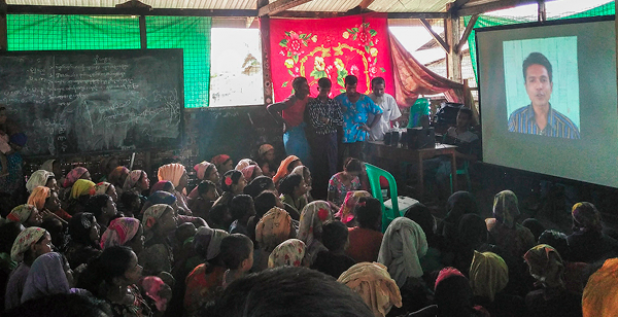
Bringing in community voices: Seeking feedback on profiling results in Sittwe, Rakhine State, Myanmar
Following the publication of the profiling report from Sittwe Township in the Rakhine State of Myanmar, JIPS and profiling partners are exploring new ways of engaging with communities on profiling results.
Building upon the lessons learned from a community workshop held in March 2017, the Danish Refugee Council (DRC)/Camp Coordination and Camp Management (CCCM) Cluster together with internally displaced persons (IDPs) from camps in Sittwe produced a 15-minute film on key findings of the recent profiling exercise. Currently being played in the camps, the objective of the film is to share profiling results and get feedback on whether these reflect the communities’ perceptions.
An innovative idea coming from IDPs themselves
The purpose of this process is to ensure that communities themselves are able to access and respond to the findings of the profiling exercise that produced data on the situation of the populations in the camps. Two elements triggered the idea for making a film: first, evidence from the profiling report shows that the level of literacy for Rakhine and Myanmar languages is relatively low in the IDP camps around Sittwe Township. Second, the workshop organised in March by JIPS and CCCM with participation from enumerators from the IDP camps indicated which methods and channels of communication communities trusted and used most regularly.
Building on this knowledge, profiling partners realised that their current way of communicating with communities – mostly relying on printed materials, such as leaflets and posters – was inefficient in both getting their messages out to concerned populations, and in obtaining their feedback. In fact, only about half of the camp-based populations were able to read and understand printed documents. Consulting with staff based in the camps, the idea of using a video to generate two-way communication was suggested. “This is something DRC has never done before in the camps, and not something I have seen other organisations do either”, explains Sophie Everest, CCCM Coordinator in Rakhine and the focal point to the process.
Role-plays to inform the profiling process and results
The video was produced during a joint workshop in which staff from IDP camps managed by DRC, NRC and LWF came together to elaborate the storyline for each section of the video. They also translated the content from English into the local Muslim language. The video features role-plays acted out by IDPs from the camps to bring some of the key messages across in a fun way, to pique interest from the community and to make the results from the data collected more engaging.
The result is a 15-minute film, produced purely in the local Muslim language, featuring various staff from organisations working in the different camps. It covers key findings from the profiling exercise (for more see the comprehensive profiling report). This includes aspects of the data collection methodology and process used, demographic data and thematic issues such as food, economic situation, and health. Not only does it cover serious and important topics for these communities, it is also fun to watch! Each section focuses on one camp to avoid any tensions that could arise from comparing between camps.
Screenings and feedback sessions in IDP camps
To bring the film to local communities, outreach workers were asked to organise two video screenings per camp. Untill the end of August 2017, presentations have taken place at community centres in 5 out of 14 IDP camps in Sittwe township. Given the big turnout at these sessions and the fact that the centres can only host up to about 50 people at a time, outreach workers also uploaded the video on their mobile phones and walked around the camps, playing it to interested community members. Some teashop owners have indicated their interest to play the video on their TVs to help disseminate and get further feedback.
Each video screening is followed by a quiz and a Q&A session. The quiz is composed of more general questions to understand what the community members take away from the video. This will inform future communication initiatives with the communities. The subsequent Q&A session provides a space for open questions and reactions from community members. Participants are invited to share their thoughts, including on whether they think that the profiling results accurately reflect their realities, what could be improved or whether the findings are missing an important perspective.
More soon!
While screenings in Sittwe Township are underway, we are currently working on translating and adding subtitles to the video so that it can be shared with the wider community interested in profiling and displacement. The official launch of the report will take place on 26 September – so stay tuned for more info on this event, as well as the video and the feedback from the communities!
Find the full report here
Text: JIPS
